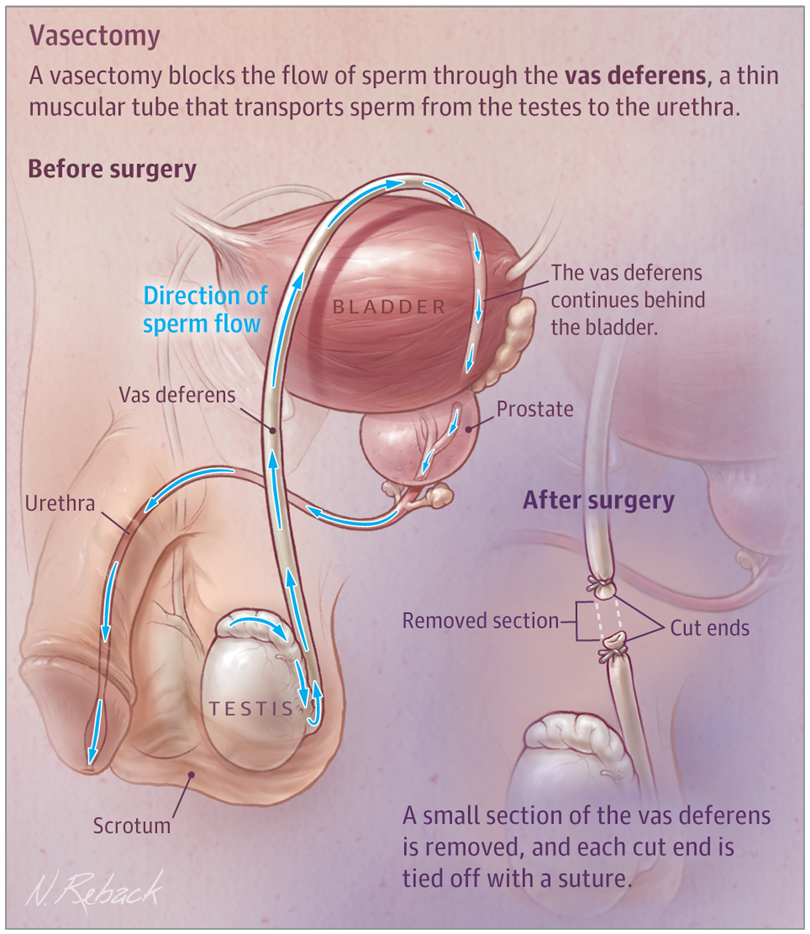No Scapel Vasectomy in South Portland, Maine
Looking for a long-term birth control option? At Fore River Urology, we offer expert vasectomy services in a comfortable outpatient clinic setting. Our board-certified urologic surgeons provide personalized care and make the process as simple, safe, and stress-free as possible.
You can request an appointment online or call us directly at 207-518-6600.
 What Is No-Scalpel Vasectomy?
What Is No-Scalpel Vasectomy?
No scalpel vasectomy is a safe, effective, and permanent form of male birth control. It is a minor office procedure that blocks the tubes (vas deferens) that carry sperm, preventing pregnancy.
- Over 99% effective at preventing pregnancy
- No impact on testosterone, sexual function, or sensation
- Quick recovery with minimal downtime
How the Procedure Works
At Fore River Urology, we perform vasectomies in our office under local anesthesia or conscious sedation with nitrous oxide (laughing gas). The procedure typically takes 15 to 20 minutes.
We use a no-scalpel technique, which requires only a small puncture instead of an incision, resulting in:
- Less discomfort
- Lower bleeding risk
- Quicker healing
After the vas deferens are blocked, sperm can no longer mix with semen. The body naturally reabsorbs the sperm.
Recovery and Aftercare
Recovery is generally quick:
- Mild soreness or swelling for a 2-3 days
- Over-the-counter pain relief
- Avoid strenuous activity for 3-7 days depending on your doctor
- Most patients return to work in 1-2 days (depending on occupation)
Important: You will need a follow-up semen analysis to confirm the absence of sperm. Use alternative contraception until then. There are still sperm stored inside a man’s body after vasectomy, and it typically takes 15-20 ejaculations over 3 months to clear them. A man is not considered infertile after vasectomy until the urologist tells him sperm are absent from a semen analysis. Until then, other forms of contraception must be continued.
Is a Vasectomy Right for You?
Vasectomy is ideal for men who are certain they do not want children in the future. While reversals are sometimes possible, they are not guaranteed and may not be covered by insurance.
Our doctors are happy to answer your questions and help you decide if this is the right choice for your long-term reproductive goals.
Why Choose Fore River Urology?
- Board-certified, fellowship-trained urologists
- Experience with thousands of vasectomy procedures
- In-office consultation, procedure, and follow-up care
What Our Patients Say
“Dr. Scoll explained everything clearly and made the process easy. I was back to normal in just a couple of days. Highly recommend Fore River Urology.”
Ready to Take the Next Step?
Call us today at 207-518-6600 or request an appointment online.
We’re here to help you make confident, informed decisions about your reproductive health.
Recommended Videos:
Additional Recommended Resources:
Vasectomy Overview – JAMA Article
What is a Vasectomy? – Urology Care Foundation
Podcast: What to Know About Vasectomy?
Pre-vasectomy instructions
Post-Vasectomy Semen Analysis

